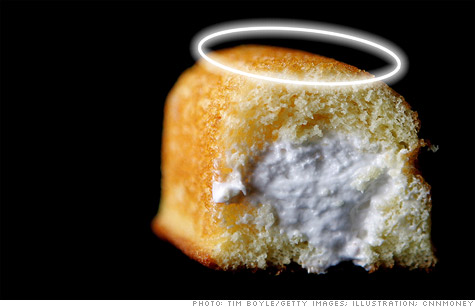Neither bankruptcy nor a liquidation can kill iconic brands.

Before the ink was even dry on Hostess Brands' bankruptcy filingWednesday morning, interested buyers were already digging into the potential value of the Hostess name and how Twinkie, Ding Dong or Wonder Bread could be repurposed into other consumer products.
For now, Hostess will continue to churn out Twinkies, but many in the bankruptcy world are questioning whether the maker of snack foods can survive.
This is Hostess Brands' second trip in bankruptcy court. It emerged in 2009 after a four and a half year restructuring.
Should Hostess Brands choose to liquidate rather than reorganize, the brand names - Twinkies, Ding Dongs and Wonder Bread - will very likely live on.
Buyers have made multi-million dollar bets on brand names like Polaroid, Sharper Image and even Borders that continue to resonate with consumers even after the parent company has liquidated.
Our favorite products -- and what we do to save them
"The marketplace has, without question, become a lot more sophisticated in terms of intellectual property since the world came to an end in the fourth quarter of 2008," said Jason Frank, a managing director in Hilco's appraisal business which values liquidated brands. "Before that everyone knew brand names were worth something but no one put much value on it."
Several private equity firms, including Hilco, Gordon Brothers and Authentic Brands, regularly show up at intellectual property auctions after a company has decided to liquidate. Rivals to the deceased companies often make bids too, driving up the prices of these brand names.
A big payoff can help the parent company pay back some of its debts.
After Polaroid filed for bankruptcy protection in December 2008, a consortium of buyers paid $88 million in 2009 for the brand name.
Not only did Polaroid's creditors get that lump sum, they also gained a minority stake in the new entity. And that stake could turn out to be quite lucrative if the company sells itself or goes public.
Many potential buyers are also weighing the value of Kodak' (EK,Fortune 500)s brand-name since there's been a lot of talk that it may consider filing for bankruptcy. For now the company plans to restructure out of court.
Kodak's brand name (not its patents) could easily generate more than double Polaroid's sales price, said Jamie Salter, the CEO of Authentic Brands. "There are a lot of categories that Kodak could attach its name to. People would feel very comfortable using Kodak paper," said Salter.
Like Polaroid, Kodak has brand cachet all over the world offering potential buyers the opportunity to tap global markets.
Twinkies will keep coming despite bankruptcy
"Part of what drives so much of this is the Internet economy," said Richard Chesley, a partner in DLA Piper's bankruptcy practice and represented Polaroid's creditors in its bankruptcy. "It's so much easier to get products manufactured globally and consumers in the developing world are often looking for iconic American branded products."
While global consumers might be drawn to shaking lots of things like a "Polaroid picture," in the words of hip hop group Outkast, even brands with significantly less cache like Borders can attract eight-figure investments. Barnes & Noble (BKS, Fortune 500) spent $13.9 million to buy the rights to its defunct rival's brand name.
A revived Twinkie may make its fans happy but it's unlikely to bring back the 19,000 jobs that would be lost if it decides to liquidate. Nearly 11,000 workers lost jobs at Borders when it liquidated.
The larger question for potential buyers of Hostesses brands is whether Twinkies and Ding Dongs can move into other products?
"For Polaroid and Sharper Image, buyers have been able to use the name and make products within a category of electronics that have a meaning to the consumer," said Cathy Hershcopf, a partner in the bankruptcy practice at the law firm Cooley. "Instead of having a non-name camera or a non-name appliance, suddenly you have a Polaroid camera or a Sharper Image one."
Hershcopf worked on the sale of Sharper Image's name to a consortium of buyers who now license its name to products sold at Target and Best Buy.
If Hostess does sell its brand-name, the question is whether in the low-carb, gluten-free age, will consumers want to see a Wonder Bread superhero?



0 Comments:
Post a Comment
Thanks to arrived and please leave your comments and visit me again ;)